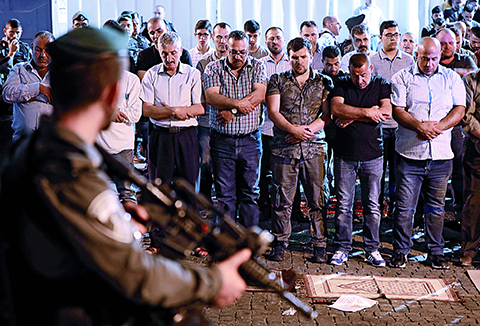 TOPSHOT - Israeli security forces stand guard in front of Palestinian Muslim worshippers praying outside Lions Gate, a main entrance to the Al-Aqsa mosque compound in Jerusalem's Old City, on July 19, 2017, as the latter protest against new Israeli security measures implemented at the holy site following an attack that killed two Israeli policemen. / AFP / Ahmad GHARABLI
TOPSHOT - Israeli security forces stand guard in front of Palestinian Muslim worshippers praying outside Lions Gate, a main entrance to the Al-Aqsa mosque compound in Jerusalem's Old City, on July 19, 2017, as the latter protest against new Israeli security measures implemented at the holy site following an attack that killed two Israeli policemen. / AFP / Ahmad GHARABLI
JERUSALEM (AP) - Israel's public security minister said yesterday that metal detectors placed at a contested Jerusalem shrine after a deadly attack there are essential to maintain security, despite a Muslim call for mass protests in the city if they are not removed. Gilad Erdan told Israel's Army Radio that Prime Minister Benjamin Netanyahu will rule on the issue later in the day after he holds security consultations upon his return from a working visit to Europe. The Israeli security services are reportedly divided over what to do given the volatility surrounding the site.
But Erdan rejected Arab accusations that new Israeli measures were an attempt to expand control over the site and insisted they were necessary to carry out proper security checks."The Israeli police needs these metal detectors so the security checks can give a proper response to the security considerations," he said. "I assume there are contacts internationally to try to calm the situation, but in my eyes there is no reason why the situation should not be calm."
Tensions are high ahead of today, the highlight of the Muslim religious week, when tens of thousands of Muslims typically attend prayers in the walled compound in Jerusalem's Old City. Muslim leaders have called for mass protests if the metal detectors are not moved before then. Conflicts over the holy site - known as the Temple Mount to Jews and Noble Sanctuary to Muslims - have repeatedly triggered Israeli-Palestinian confrontations.
Three Arab gunmen launched an attack from there last week, killing two Israeli policemen at a gate to the Muslim-administered compound. In response, Israel began installing metal detectors - a security measure it said is used routinely at holy sites around the world. Muslim clerics have been urging the faithful to forego prayers in neighborhood mosques on Friday and converge on the shrine, in an attempt to draw larger crowds. Worshippers have been asked this week to pray in the streets rather than submit to the new security procedures.
Israeli capitulation
Netanyahu, who is in Hungary, held a pair of urgent phone conversations with his security chiefs Wednesday and appears to be under intense international pressure to back down. Netanyahu said Israel is in close contact with Jordan, the traditional Muslim custodian of the shrine, to find a peaceful solution to the conflict. Jordan's ruling Hashemite dynasty, with ancestry said to go back to Prophet Muhammad, derives much of its legitimacy from custodianship over the shrine.
The site remained quiet yesterday and Azzam Khatib, the director of the site's Muslim administration, or Waqf, said he was hopeful an arrangement could be found before the Friday prayers. "We will never ever accept any changes in the mosque, and Israel has to put an end to this crisis by removing the metal detectors," he said. Nationalist Israeli politicians have been pressuring Netanyahu from the opposite direction.
Education Minister Naftali Bennett, leader of the pro-settler Jewish Home party, warned of an Israeli "capitulation" that "will damage Israel's power of deterrence and will endanger the lives of the visitors, the worshippers and the police officers." After last week's shooting, Israel closed the site for two days for searches. It was only the third closure since Israel captured the shrine, along with east Jerusalem and other territories, in the 1967 Mideast war.
The closure drew wide condemnation from the Muslim world. Israel began opening the site gradually on Sunday. Jews revere the 37-acre raised platform as the site of their biblical temples. It is the holiest site in Judaism and the nearby Western Wall, a remnant of one of the temples, is the holiest place where Jews can pray. Muslims believe the hilltop marks the spot from which the Prophet Muhammad ascended to heaven. It is Islam's third-holiest site after Mecca and Medina in Saudi Arabia. - AP




